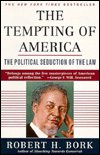Judges, Politicians, and America's Game.
The great misfortune is that a notion obtains with those in power, that the world, or the people require more governing than is necessary. To govern too well is a great science, but no country is ever improved by too much governing . . . most men think when they are elevated to position, that it requires an effort to discharge their duties, and they leave common sense out of the question.
--Sam Houston.
Consider baseball. Chief Justice John Roberts has said that he sees his role like that of an umpire, calling balls and strikes. But Roberts didn't elaborate--so I will. The umpire-judge doesn't make rules. And he doesn't play the game.
The judge calls balls and strikes. What he does not do is redesign the strike zone.
That legislative decision was made elsewhere. Another body made the rules. The umpire merely applies them. A strike is above the knees, below the shoulders, and above the plate. Anything else is a ball. Sure, the umpire is imperfect. But he knows his role: to understand the law as it comes down to him and apply it to everything the pitcher throws at him.
What is an activist judge? He's the umpire who makes up a new strike zone. And activist judges are judges who step outside their proper role as judges. They are like the politicians who enter office seeking new ways to assert and grow their own power and authority. Or like the ones who think only of creating a legacy. In other words, these people, both judges and politicians, are the ones Sam Houston complained of: "they think when they are elevated to position, that it requires an effort to discharge their duties, and they leave common sense out of the question."
Our system requires a Separation of Powers. On rare occasions, the Executive Branch shares a legislative role, and the Legislative Branch shares an executive role. For example, the Executive takes on a legislative role when he uses his veto power. And the legislature takes on an executive role when it is required to ratify treaties entered by the president with a 2/3 vote.
But at no time does the Judicial Branch (at least as contemplated by the Constitution) share either. This third branch of our government is entirely different from the first two. The first two are made up entirely of politicians. They look at problems, search their hearts, talk to voters, and sponsor and draft laws. But the courts are entirely different. They (usually) don't run for office, they do not respond to voters, they do not listen to anyone's heart, and they do not create new law (other than "interstitially"). Moreover, the Founders described the third branch, the Judicial Branch, as being by far, the weakest of the three. . . .
Robert Bork put it this way: "There is not the faintest hint in the Constitution . . . that the judiciary shares any of the legislative or executive power. The intended function of the federal courts is to apply the law as it comes to them from the hands of others."
--The Tempting of America: the Political Seduction of the Law, 1990. 4.


0 Comments:
Post a Comment
<< Home